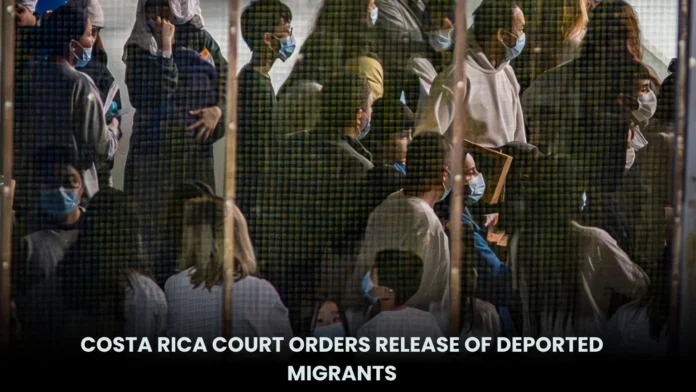Costa Rica Court Orders Release of Deported Migrants: Introduction
Imagine being uprooted in the dead of night, sent across borders, then branded an outsider with no voice. That’s exactly what happened to nearly 200 Asian and African migrants deported to Costa Rica by the Trump administration in February 2025. Held in a remote facility near the Panama border, many were unaware of their right to seek asylum, speak to legal counsel, or communicate freely—until Costa Rica’s highest court intervened.
What the Court Found and Why It Matters
Court Identifies Rights Violations, Demands Action
In a close 4–3 ruling, Costa Rica’s Constitutional Court determined the government had violated the fundamental rights of deported migrants by failing to:
- Provide timely and sufficient information about their immigration status.
- Ensure access to legal counsel.
- Inform them of their right to request asylum.
- Permit free contact with the media.
Where the Migrants Came From and Who Stayed
The deportation flights included individuals and families from China, Afghanistan, India, Pakistan, Russia, and Uzbekistan. More than 70 were children. Initially, 200 migrants arrived in Costa Rica under an agreement that raised concerns about external pressure on the small Central American nation.
By the time of the ruling:
- 107 individuals had been repatriated.
- 35 left voluntarily.
- 30 had applied for asylum.
- 28 individuals, including 13 minors, remained at the migrant shelter.
Government Pushback: “Freedom Within CATEM”
Authorities in Costa Rica strongly disagreed with the court’s ruling. The deputy minister of the interior maintained that the individuals at the shelter had enjoyed “complete freedom” since April, arguing that they could leave and move about freely.
However, earlier legal complaints and visits by journalists suggested otherwise. Many migrants lived in overcrowded, poorly ventilated conditions in a hot and humid region, had their passports confiscated, and lacked basic access to legal or psychological support.
A Human Face: Stories Behind the Numbers
A Father Fleeing Political Persecution
German Smirnov, 36, a Russian, was one of the migrants; he was deported along with his wife and children, age 6. A former electoral official, he had reported electoral fraud in Russia and was later identified by the authorities. Fearing imprisonment or forced conscription upon return, he described his situation with stark clarity:
“They’ll put me in jail or send me to war.”
A Woman Escaping the Taliban
Another migrant, a young woman from Afghanistan, revealed she had fled her home after resisting a forced marriage and seeking to continue her education. She worried about being targeted if she were returned to her country:
“They will kill me if I go back.”
Why This Ruling Raises Regional Implications
Precedent to Halt Detention-by-Agreement
This landmark ruling may influence how other nations approach “third-country deportation” deals. By emphasizing individual rights over international diplomacy, it highlights the legal and ethical complications of transferring deportees without proper safeguards.
Support from Human Rights Advocates
The decision was welcomed by international human rights lawyers and organizations that had previously filed a case before the United Nations Committee on the Rights of the Child. They had argued that Costa Rica failed to provide access to education, legal aid, and psychological care for migrant children.
Balancing Diplomatic Pressure and Human Rights
President Rodrigo Chaves publicly acknowledged that Costa Rica agreed to the deportation deal out of concern for potential retaliation from the United States. Referring to the U.S. as the “economically powerful brother to the north,” Chaves hinted that failure to cooperate could result in punitive economic measures affecting free trade zones.
Foreign Minister Arnoldo André Tinoco attempted to temper these comments, stating there was no formal pressure but admitting that diplomatic signals were interpreted as a need for goodwill. He clarified that Costa Rica had not been coerced, but that cooperation was seen as a strategic gesture.
What Happens Next?
Immediate Effects
The Costa Rican government now has a 15-day window to:
- Release the remaining detainees.
- Review and determine each migrant’s immigration status.
- Evaluate their need for housing, medical care, legal representation, and education.
- Return confiscated identification and travel documents.
Long-Term Ramifications
This judicial intervention is likely to impact Costa Rica’s foreign relations and future migration policies. It may also influence how other Latin American nations negotiate and enforce third-country deportation agreements, particularly when dealing with powerful allies.
Conclusion: A Turning Point for Justice and Migration
Costa Rica’s Constitutional Court has issued a powerful reminder that legal and humanitarian obligations cannot be brushed aside, even under international pressure. By prioritizing the rights and dignity of migrants—especially vulnerable minors—it has carved a new path for how democratic societies should approach global migration in an era of increasing displacement and political complexity.
Whether this becomes a catalyst for broader regional change or remains a singular instance of judicial boldness remains to be seen. But for the 28 still waiting at CATEM, justice has come—not through politics, but through the courts.


